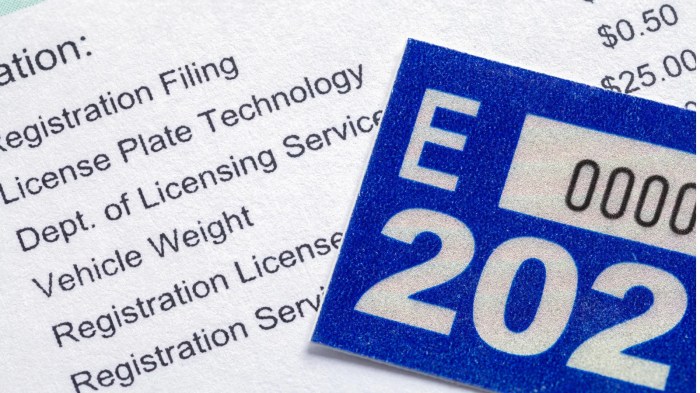
Can a car be registered and insured in different names? This question arises frequently, especially when considering family vehicles, business vehicles, or unique ownership arrangements. The answer, like most legal matters, depends on a complex interplay of factors, including local laws, insurance policies, and the specific circumstances involved. Understanding these nuances is crucial for navigating the complexities of car ownership and ensuring legal compliance.
The legal framework governing vehicle registration and insurance varies significantly from jurisdiction to jurisdiction. Some regions may allow for different names on the registration and insurance policy, while others may have strict rules requiring both documents to reflect the same individual. It’s essential to research the specific regulations in your area before making any decisions about registering or insuring a vehicle in different names.
Legal and Regulatory Considerations
The legality of registering and insuring a vehicle in different names varies significantly depending on the jurisdiction. Understanding the legal framework governing vehicle registration and insurance in your specific region is crucial to avoid potential legal complications.
Potential Consequences of Discrepancies
Registering and insuring a vehicle in different names can have legal ramifications. These consequences can vary depending on the jurisdiction and the specific circumstances.
- Insurance Claims: If the insured party is not the registered owner, an insurance claim may be denied or delayed. The insurance company might argue that the policyholder does not have a legitimate insurable interest in the vehicle.
- Traffic Violations and Accidents: If the driver of the vehicle is not the registered owner, they could face fines or penalties for traffic violations or accidents. In some cases, the registered owner could be held liable for the actions of the driver, even if they were not behind the wheel.
- Legal Disputes: Discrepancies between the registered owner and the insured party can lead to legal disputes. For example, if a vehicle is involved in an accident and the insurance company denies coverage due to a name mismatch, the registered owner might be forced to pursue legal action to recover damages.
Situations Where Discrepancies Might Be Necessary or Beneficial
There are specific situations where registering and insuring a vehicle in different names might be necessary or beneficial.
- Business Vehicles: Companies often register vehicles in their name but insure them under a separate policy for their employees. This allows the company to maintain control of the vehicle while providing insurance coverage for the employees who drive it.
- Family Vehicles: In some cases, family members might share a vehicle but prefer to have separate insurance policies. This can be advantageous if one member has a higher risk profile, as it prevents their driving history from impacting the insurance premiums of other family members.
- Gifted Vehicles: When a vehicle is gifted, the donor might choose to remain the registered owner while the recipient becomes the insured party. This can help ensure that the vehicle is properly insured while allowing the recipient to use it without having to register it in their name.
Registration Processes

Registering a vehicle in different names can be a complex process, varying significantly depending on the jurisdiction. This section Artikels the typical steps involved, compares and contrasts the registration procedures across different locations, and identifies potential challenges that may arise.
Steps Involved in Vehicle Registration
The registration process generally involves these steps:
- Application Submission: The first step is to submit an application to the relevant government agency, typically the Department of Motor Vehicles (DMV) or a similar entity. This application usually requires specific information about the vehicle, including the Vehicle Identification Number (VIN), make, model, year, and odometer reading.
- Documentation: Along with the application, you’ll need to provide supporting documentation. This often includes:
- Proof of ownership, such as a bill of sale or title certificate.
- Proof of identity, such as a driver’s license or passport.
- Proof of insurance.
- Vehicle inspection report (if required by the jurisdiction).
Comparison of Registration Processes
Registration processes can differ significantly across jurisdictions. Here’s a comparison:
- United States: In the US, each state has its own set of regulations regarding vehicle registration. While the general process is similar, there are variations in documentation requirements, fees, and inspection procedures. For instance, some states require a vehicle inspection, while others do not.
- Canada: In Canada, each province has its own vehicle registration system. Similar to the US, the process involves submitting an application, providing documentation, and paying fees. However, specific requirements and fees may vary between provinces.
- European Union: The EU has standardized some aspects of vehicle registration, making the process more consistent across member states. However, certain differences remain, such as language requirements and specific documentation.
Potential Challenges in Registration
Registering a vehicle in different names can present several challenges:
- Proof of Ownership: Providing clear and acceptable proof of ownership can be challenging, especially if the vehicle is being transferred between individuals or entities. The DMV may require specific documentation, such as a bill of sale or a notarized title transfer.
- Legal Compliance: Ensuring that the registration process complies with all relevant laws and regulations is crucial. Failure to meet these requirements can lead to fines or legal repercussions.
- Fraudulent Activities: Registering a vehicle in a different name can be used for fraudulent purposes. Therefore, authorities may scrutinize applications and documentation more closely in such cases.
Insurance Policies: Can A Car Be Registered And Insured In Different Names

Insurance policies are essential for protecting yourself financially in the event of an accident or damage to your vehicle. They provide coverage for various risks, including liability, collision, and comprehensive coverage. Understanding the different types of insurance policies available and the factors that influence premiums is crucial for making informed decisions.
Types of Insurance Policies, Can a car be registered and insured in different names
Various insurance policies cater to different needs and risks associated with vehicle ownership. Here are some common types:
- Liability Insurance: This type of insurance covers damages or injuries you cause to other people or their property in an accident. It’s usually required by law and typically includes bodily injury liability and property damage liability.
- Collision Coverage: This coverage pays for repairs or replacement of your vehicle if it’s damaged in an accident, regardless of who is at fault. It covers the cost of repairs up to the actual cash value of your vehicle, minus any deductible.
- Comprehensive Coverage: This coverage protects your vehicle against damages caused by events other than accidents, such as theft, vandalism, fire, or natural disasters. It covers repairs or replacement of your vehicle up to its actual cash value, minus any deductible.
Factors Affecting Premiums
Insurance companies consider various factors when determining your insurance premiums. These factors include:
- Vehicle Type and Value: The type, make, model, and value of your vehicle significantly influence your premium. Higher-value vehicles generally attract higher premiums due to the greater cost of repairs or replacement.
- Driving History: Your driving record, including accidents, traffic violations, and driving experience, plays a significant role in determining your premium. Drivers with a history of accidents or violations tend to pay higher premiums.
- Location: The geographic location where you live and drive impacts your premium. Areas with higher accident rates or crime rates generally have higher premiums.
- Named Insured: The person named on the insurance policy, also known as the policyholder, significantly influences the premium. Insurance companies assess the driving history, age, and other risk factors of the named insured.
Implications of Naming Different Individuals
Naming different individuals on the insurance policy can have various implications, including:
- Premium Differences: If the named insured has a different driving history or risk profile than the actual driver, it can affect the premium. For example, if a young driver with a less-than-perfect driving record is named on the policy, the premium may be higher than if an older driver with a clean record is named.
- Coverage Differences: Depending on the policy terms, naming different individuals may impact the coverage available. Some policies may restrict coverage to the named insured, while others may extend coverage to other drivers, such as family members or authorized drivers.
- Liability Issues: In the event of an accident, the named insured may be held liable for damages, even if they were not driving the vehicle at the time. It’s crucial to understand the liability implications of naming different individuals on the insurance policy.
Ownership and Liability
When a vehicle is registered and insured in different names, it creates a complex legal situation with potential implications for ownership, liability, and the outcome of any accidents or incidents involving the vehicle.
Legal Relationships
The legal relationships between the registered owner, the insured party, and the driver of a vehicle registered and insured in different names are interconnected and subject to legal interpretation.
- Registered Owner: The registered owner is the individual or entity legally recognized as the owner of the vehicle. They are typically responsible for complying with registration requirements, including paying taxes and fees. The registered owner’s name is usually displayed on the vehicle’s registration certificate.
- Insured Party: The insured party is the individual or entity covered by the insurance policy for the vehicle. They are typically the ones who pay the insurance premiums and are entitled to the benefits provided by the policy, such as coverage for damages or injuries. The insured party’s name is listed on the insurance policy.
- Driver: The driver is the individual operating the vehicle at the time of an incident. They are responsible for following traffic laws and driving safely. The driver’s name is not necessarily listed on the registration certificate or insurance policy.
Liability Risks
Registering and insuring a vehicle in different names can create several liability risks:
- Disputes Over Ownership: If the registered owner and the insured party are different, it could lead to disputes over ownership, especially in the event of an accident or legal claim. This can become particularly complex if the insured party is not the actual owner of the vehicle.
- Insurance Coverage Issues: If the driver is not the insured party, insurance coverage may be limited or denied. For example, if the driver is not listed on the policy as a covered driver, they might not be entitled to the full benefits of the insurance policy in case of an accident.
- Financial Liability: If the driver is found liable for an accident, the registered owner and the insured party could be held financially responsible for damages or injuries. The registered owner could be held liable for failing to ensure the vehicle is operated safely, while the insured party could be liable for the costs of repairs or medical expenses, depending on the terms of the insurance policy.
Legal Implications of Accidents
In case of an accident involving a vehicle registered and insured in different names, the legal implications can be complex and vary depending on the specific circumstances:
- Determining Liability: Establishing liability for the accident requires investigating the actions of the driver, the condition of the vehicle, and the involvement of any other parties. The registered owner, the insured party, and the driver could all be held liable for different aspects of the accident.
- Insurance Coverage: The insurance policy will determine the extent of coverage available to the parties involved. If the driver is not listed as a covered driver on the policy, they might not be eligible for benefits, and the insured party might face limitations on coverage.
- Legal Proceedings: If the parties cannot reach an agreement, legal proceedings may be necessary to resolve disputes over liability, insurance coverage, and financial compensation.
Practical Considerations
Registering and insuring a vehicle in different names can be a complex process, but it can also be a practical solution for certain situations. This section explores the practical aspects of this practice, providing tips for individuals considering it and offering real-world examples of how it can be beneficial.
Financial Considerations
Financial considerations are a key aspect of registering and insuring a vehicle in different names. Understanding these factors can help individuals make informed decisions.
- Insurance Premiums: Insurance premiums are often based on factors such as the driver’s age, driving history, and the vehicle’s value. Registering a vehicle in a different name might impact insurance premiums, potentially leading to higher or lower costs depending on the individual’s circumstances. For example, if a younger driver with a less favorable driving record is the registered owner, insurance premiums might be higher compared to an older driver with a clean driving record. However, if the registered owner is a business with a lower risk profile, premiums might be lower.
- Tax Implications: Depending on the jurisdiction, registering a vehicle in a different name might have tax implications. For example, if a business owns a vehicle, it might be able to deduct certain expenses related to the vehicle, such as depreciation and insurance premiums, as business expenses. However, if a family member is the registered owner, these deductions might not be available. It is essential to consult with a tax professional to understand the specific tax implications in each situation.
- Loan Payments: If the vehicle is financed, the lender might have specific requirements regarding the registered owner. It’s important to check with the lender before making any changes to the vehicle’s registration. For example, if a business owns a vehicle but a family member is the registered owner, the lender might require the business to be listed as a lienholder on the vehicle’s title.
Logistical Considerations
Logistical considerations are crucial when registering and insuring a vehicle in different names. These aspects involve practical steps and processes that need to be addressed.
- Documentation: Proper documentation is essential for registering and insuring a vehicle in different names. This includes the vehicle’s title, proof of insurance, and driver’s licenses for all parties involved. It’s crucial to ensure all documentation is accurate and up-to-date.
- Registration Process: The registration process might vary depending on the jurisdiction. Individuals should familiarize themselves with the specific requirements and procedures for their location. This typically involves completing applications, providing necessary documentation, and paying applicable fees.
- Insurance Coverage: Insurance coverage should be carefully considered when registering a vehicle in different names. It’s important to ensure that all parties involved have adequate coverage and that the policy meets their specific needs. For example, if a business owns a vehicle but a family member is the registered owner, the business might need to obtain commercial insurance to cover its liability.
Real-World Examples
Real-world examples can provide a clearer understanding of how registering and insuring a vehicle in different names might be applied in practice. Here are some scenarios where this practice might be useful:
- Family Vehicles: In some families, one member might be the registered owner of a vehicle, while another family member is the primary driver. This can be helpful for various reasons, such as obtaining lower insurance premiums or avoiding the impact of a driver’s poor driving record on the family’s overall insurance rates. For example, if a parent has a young driver in the family with a less favorable driving record, registering the vehicle in their name might result in higher insurance premiums. However, if the vehicle is registered in the name of a parent with a clean driving record, the insurance premiums might be lower.
- Business Vehicles: Businesses often register vehicles in their name for tax and liability reasons. However, if an employee is the primary driver of the vehicle, the business might choose to have the employee registered as the owner. This can be beneficial for tax purposes, as the employee might be able to deduct certain expenses related to the vehicle as personal expenses. However, it’s important to note that the business would still be liable for any accidents or damages caused by the vehicle.
Ending Remarks

The practice of registering and insuring a car in different names can be a complex and potentially risky endeavor. While it may seem like a simple solution in some cases, it’s crucial to fully understand the legal and financial implications involved. Before making any decisions, consulting with legal and insurance professionals is highly recommended to ensure compliance with all relevant regulations and to minimize potential liabilities.
FAQ Resource
Can I register a car in my name but insure it in my spouse’s name?
It’s possible, but you need to check your local laws and insurance policies. Some jurisdictions might require the same name on both documents. It’s also important to consider how this arrangement might affect insurance premiums and coverage.
What happens if I’m in an accident and the car is registered and insured in different names?
The legal implications of an accident involving a vehicle registered and insured in different names can be complicated. It’s crucial to understand the liability and coverage provisions of the insurance policy, as well as the relevant legal framework in your jurisdiction.
